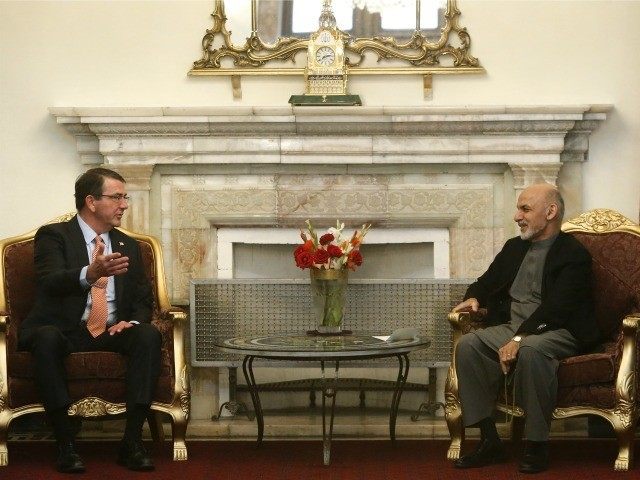Afghan President Ashraf Ghani indicated that peace negotiations between Afghanistan and the Taliban are within reach now, more than 13 years after the war began, following the 9/11 terrorist attacks on the U.S. homeland.
“The grounds for peace have never been better in the last 36 years” of perpetual Afghan wars, including more than 13 years of conflict with the Taliban, President Ghani told reporters in Kabul on Saturday during a joint press conference with U.S. Defense Secretary Ashton Carter.
“Our approach is productive. We’re hopeful, but categorical answers in a peace process are dangerous… The direction is positive. We cannot make premature announcements,” he continued.
Neither Ghani nor Carter offer any predictions on upcoming peace negotiations after Pakistan and Afghan officials said the Taliban signaled they were willing to commence peace talks with the Afghan government. China reportedly offered to broker the talks.
Unnamed sources told The Associated Press (AP) that peace talks between the Afghan government and the Taliban could materialize as early as March. Currently, there is no dialogue between the two parties, the sources added.
A senior Afghan Taliban member told Reuters that Taliban “negotiators would hold a first round of talks with U.S. officials in Qatar,” on February 19.
However, the Obama White House has denied any potential peace talks, direct or indirect, between the U.S. and the Taliban.
Citing an anonymous Taliban source and an unnamed Western diplomat, AP reports that U.S. officials have met with the terrorists at least once at the Taliban office in the Qatari capital of Doha “to discuss issues likely to arise if and when peace negotiations do begin.”
“The issues include the release of Taliban prisoners from Guantanamo Bay, the removal of Taliban names from lists of known terrorists, and freedom of travel for Taliban members,” the diplomat told AP.
The Pentagon has said that after 2014, it will only target members of the group who pose a direct threat to the U.S. and its Afghan allies.
Thousands of Taliban members have already been reintegrated into Afghan society since the creation of the U.S.-backed Afghan Peace and Reintegration Program.
The program, which receives a bulk of its funding from U.S. taxpayers, removes Taliban terrorists from the battlefield, after they are vetted by Afghan authorities, and funds projects that support their reintegration.
“Since the program’s creation in 2010, over 9,000 fighters have been reintegrated into Afghan society,” revealed the Pentagon in an October 2014 report.
AP reports that some Taliban leaders maintain that all foreign troops must first leave Afghanistan before a dialogue on the prospect of peace negotiations even begins.
There are currently an estimated 10,000 U.S. troops and nearly 3,000 from NATO in Afghanistan, training their Afghan counterparts and conducting counterterrorism operations, primarily against al-Qaeda and its remnants.
Obama plans to reduce the number of American troops in Afghanistan by half to about 5,000 by the end of this year and to a near zero embassy presence by the end of 2016. There were nearly 140,000 U.S. and NATO troops in Afghanistan during the peak of the war.
Although no specific decision has been made, Carter said Obama may delay the withdrawal of U.S. forces from Afghanistan and is considering possible changes to future counterterrorism operations in the country.
During the course of the Afghanistan war, which began Oct. 7, 2001, at least 2,216 U.S. soldiers have been killed and an estimated 20,000 have been wounded, primarily by Taliban terrorists.
Taliban militants have killed and wounded Afghan civilians and forces by the tens of thousands during the conflict. Last year was the bloodiest of the war for Afghan forces (about 5,000 fatalities) and civilians (more than 10,000 casualties).
“Since taking office in September, Ghani has rolled out a complex strategy aimed at forcing the Taliban leadership to accept that their cause — replacing his government with an Islamist emirate — is hopeless,” explains AP. “He has enlisted the support of regional countries believed to protect, fund and arm the Taliban, including Pakistan which is pressuring the insurgents to open a channel for peace negotiations, officials and diplomats said.”

COMMENTS
Please let us know if you're having issues with commenting.